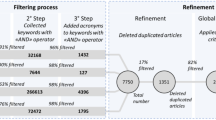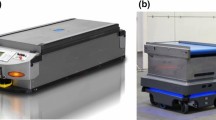Abstract
Increasing product variety and fluctuating demand have led to the need of assembly systems that can adapt to multiple different products as the return of investment for dedicated assembly lines is more and more difficult to achieve. In response to this challenge, the paradigm of reconfigurable assembly systems has emerged. However, configuring and optimizing these systems still pose challenges in the industry. This paper proposes a new simple optimization approach for the configuration analysis and optimization of a reconfigurable multi-product assembly system in the automotive industry, using configuration selection, task allocation, and sequencing. Its effectiveness is validated throughout three real industrial study cases in the automotive supplier industry.












Similar content being viewed by others
Data availability
As only real production data of the industrial partner company has been used, no data set can be provided due to confidentiality issues.
References
Koren Y (2010) The global manufacturing revolution: product-process-business integration and reconfigurable systems. Wiley, Hoboken, NJ
Michalos G, Makris S, Papakostas N et al (2010) Automotive assembly technologies review: challenges and outlook for a flexible and adaptive approach. CIRP J Manuf Sci Technol 2:81–91. https://doi.org/10.1016/j.cirpj.2009.12.001
Koren Y, Heisel U, Jovanova F et al (1999) Reconfigurable manufacturing systems. CIRP Ann Manuf Technol 48:527–540. https://doi.org/10.1016/S0007-8506(07)63232-6
Napoleone A, Pozzetti A, Macchi M (2018) A framework to manage reconfigurability in manufacturing. Int J Prod Res 56:3815–3837. https://doi.org/10.1080/00207543.2018.1437286
Michalos G, Makris S, Chryssolouris G (2015) The new assembly system paradigm. Int J Comput Integr Manuf 28:1252–1261. https://doi.org/10.1080/0951192X.2014.964323
Rösiö C, Aslam T, Srikanth KB, Shetty S (2019) Towards an assessment criterion of reconfigurable manufacturing systems within the automotive industry. Procedia Manufacturing. Elsevier Science, Nantes, France, pp 76–82
Lafou M, Mathieu L, Pois S, Alochet M (2016) Manufacturing system flexibility: product flexibility assessment. Procedia CIRP 41:99–104. https://doi.org/10.1016/j.procir.2015.12.046
Bi ZM, Lang SYT, Shen W, Wang L (2008) Reconfigurable manufacturing systems: the state of the art. Int J Prod Res 46:967–992. https://doi.org/10.1080/00207540600905646
Michalos G, Fysikopoulos A, Makris S et al (2015) Multi criteria assembly line design and configuration – an automotive case study. CIRP J Manuf Sci Technol 9:69–87. https://doi.org/10.1016/j.cirpj.2015.01.002
Michalos G, Makris S, Mourtzis D (2012) An intelligent search algorithm-based method to derive assembly line design alternatives. Int J Comput Integr Manuf 25:211–229. https://doi.org/10.1080/0951192X.2011.627949
Bi ZM, Wang L, Lang SYT (2007) Current status of reconfigurable assembly systems. IJMR 2:303. https://doi.org/10.1504/IJMR.2007.014727
Koren Y, Gu X, Guo W (2018) Reconfigurable manufacturing systems: principles, design, and future trends. Front Mech Eng 13:121–136. https://doi.org/10.1007/s11465-018-0483-0
Bortolini M, Galizia FG, Mora C (2018) Reconfigurable manufacturing systems: literature review and research trend. J Manuf Syst 49:93–106. https://doi.org/10.1016/j.jmsy.2018.09.005
Brahimi N, Dolgui A, Gurevsky E, Yelles-Chaouche A (2019) A literature review of optimization problems for reconfigurable manufacturing systems. IFAC-PapersOnLine 52:433–438. https://doi.org/10.1016/j.ifacol.2019.11.097
Yelles-Chaouche A, Gurevsky E, Brahimi N, Dolgui A (2021) Reconfigurable manufacturing systems from an optimisation perspective: a focused review of literature. Int J Prod Res 59:6400–6418. https://doi.org/10.1080/00207543.2020.1813913
Ashraf M, Hasan F (2018) Configuration selection for a reconfigurable manufacturing flow line involving part production with operation constraints. Int J Adv Manuf Technol 98:2137–2156. https://doi.org/10.1007/s00170-018-2361-7
Benderbal HH, Dahane M, Benyoucef L (2015) A new robustness index formachines selection in Reconfigurable Manufacturing System. In: 2015 International Conference on Industrial Engineering and Systems Management (IESM). IEEE, Seville, Spain, 1019–1026. https://doi.org/10.1109/IESM.2015.7380279
Benderbal HH, Dahane M, Benyoucef L (2017) Flexibility-based multi-objective approach for machines selection in reconfigurable manufacturing system (RMS) design under unavailability constraints. Int J Prod Res 55:6033–6051. https://doi.org/10.1080/00207543.2017.1321802
Benderbal HH, Dahane M, Benyoucef L (2018) Modularity assessment in reconfigurable manufacturing system (RMS) design: an Archived Multi-Objective Simulated Annealing-based approach. Int J Adv Manuf Technol 94:729–749. https://doi.org/10.1007/s00170-017-0803-2
Bensmaine A, Dahane M, Benyoucef L (2013) A non-dominated sorting genetic algorithm based approach for optimal machines selection in reconfigurable manufacturing environment. Comput Ind Eng 66:519–524. https://doi.org/10.1016/j.cie.2012.09.008
Bryan A, Wang H, Abell JA (2013) Concurrent design of product families and reconfigurable assembly systems. J Mech Design - Trans ASME 135:0510011–0510016. https://doi.org/10.1115/1.4023920
Choi Y-C, Xirouchakis P (2015) A holistic production planning approach in a reconfigurable manufacturing system with energy consumption and environmental effects. Int J Comput Integr Manuf 28:379–394. https://doi.org/10.1080/0951192X.2014.902106
Dou J, Dai X, Meng Z (2009) Graph theory-based approach to optimize single-product flow-line configurations of RMS. Int J Adv Manuf Technol 41:916–931. https://doi.org/10.1007/s00170-008-1541-2
Dou J, Dai X, Meng Z (2009) Precedence graph-oriented approach to optimise single-product flow-line configurations of reconfigurable manufacturing system. Int J Comput Integr Manuf 22:923–940. https://doi.org/10.1080/09511920902870650
Dou J, Dai X, Meng Z (2010) Optimisation for multi-part flow-line configuration of reconfigurable manufacturing system using GA. Int J Prod Res 48:4071–4100. https://doi.org/10.1080/00207540903036305
Dou J, Dai X, Meng Z (2011) A GA-based approach for optimizing single-part flow-line configurations of RMS. J Intell Manuf 22:301–317. https://doi.org/10.1007/s10845-009-0305-7
Dou J, Li J, Su C (2016) Bi-objective optimization of integrating configuration generation and scheduling for reconfigurable flow lines using NSGA-II. Int J Adv Manuf Technol 86:1945–1962. https://doi.org/10.1007/s00170-015-8291-8
Dou J, Li J, Xia D, Zhao X (2021) A multi-objective particle swarm optimisation for integrated configuration design and scheduling in reconfigurable manufacturing system. Int J Prod Res 59:3975–3995. https://doi.org/10.1080/00207543.2020.1756507
Elbenani B, Ferland JA (2012) An exact method for solving the manufacturing cell formation problem. Int J Prod Res 50:4038–4045. https://doi.org/10.1080/00207543.2011.588622
Goyal KK, Jain PK (2016) Design of reconfigurable flow lines using MOPSO and maximum deviation theory. Int J Adv Manuf Technol. https://doi.org/10.1007/s00170-015-7760-4
Kalayci CB, Gupta SM (2013) A particle swarm optimization algorithm with neighborhood-based mutation for sequence-dependent disassembly line balancing problem. Int J Adv Manuf Technol 69:197–209. https://doi.org/10.1007/s00170-013-4990-1
Özceylan E, Kalayci CB, Güngör A, Gupta SM (2019) Disassembly line balancing problem: a review of the state of the art and future directions. Int J Prod Res 57:4805–4827. https://doi.org/10.1080/00207543.2018.1428775
Khezri A, Benderbal HH, Benyoucef L (2019) A sustainable reconfigurable manufacturing system designing with focus on environmental hazardous wastes. In: 2019 24th IEEE International Conference on Emerging Technologies and Factory Automation (ETFA). IEEE, Zaragoza, Spain, 317–324. https://doi.org/10.1109/ETFA.2019.8869380
Khezri A, Benderbal HH, Benyoucef L, Dolgui A (2020) Diagnosis on energy and sustainability of reconfigurable manufacturing system (RMS) design: a bi-level decomposition approach. In: 2020 IEEE International Conference on Industrial Engineering and Engineering Management (IEEM). IEEE, Singapore, Singapore, 141–145
Kumar A, Pattanaik LN, Agrawal R (2019) Optimal sequence planning for multi-model reconfigurable assembly systems. Int J Adv Manuf Technol 100:1719–1730. https://doi.org/10.1007/s00170-018-2826-8
Li F, Zhang L, Liao TW, Liu Y (2019) Multi-objective optimisation of multi-task scheduling in cloud manufacturing. Int J Prod Res 57:3847–3863. https://doi.org/10.1080/00207543.2018.1538579
Liu A, Pfund M, Fowler J (2016) Scheduling optimization of task allocation in integrated manufacturing system based on task decomposition. J of Syst Eng Electron 27:422–433. https://doi.org/10.1109/JSEE.2016.00043
Liu C, Xiang X, Zheng L, Ma J (2018) An integrated model for multi-resource constrained scheduling problem considering multi-product and resource-sharing. Int J Prod Res 56:6491–6511. https://doi.org/10.1080/00207543.2017.1363428
Maniraj M, Pakkirisamy V, Jeyapaul R (2017) An ant colony optimization–based approach for a single-product flow-line reconfigurable manufacturing systems. Proc Inst Mech Eng, Part B: J Eng Manuf 231:1229–1236. https://doi.org/10.1177/0954405415585260
Ren W, Wen J, Yan Y et al (2021) Multi-objective optimisation for energy-aware flexible job-shop scheduling problem with assembly operations. Int J Prod Res 59:7216–7231. https://doi.org/10.1080/00207543.2020.1836421
Müller C, Grunewald M, Spengler TS (2017) Redundant configuration of automated flow lines based on “Industry 4.0”-technologies. J Bus Econ 87:877–898. https://doi.org/10.1007/s11573-016-0831-7
Campos Sabioni R, Daaboul J, Le Duigou J (2022) Concurrent optimisation of modular product and Reconfigurable Manufacturing System configuration: a customer-oriented offer for mass customisation. Int J Prod Res 60:2275–2291. https://doi.org/10.1080/00207543.2021.1886369
Saxena LK, Jain PK (2021) Multi-state reconfigurable manufacturing system configuration design with availability consideration. In: Panchal D, Chatterjee P, Pamucar R, Tyagi M (eds) Reliability and Risk Modeling of Engineering Systems. Springer International Publishing, Cham, pp 57–73
Touzout FA, Benyoucef L (2019) Multi-objective sustainable process plan generation in a reconfigurable manufacturing environment: exact and adapted evolutionary approaches. Int J Prod Res 57:2531–2547. https://doi.org/10.1080/00207543.2018.1522006
Xi S, Smith JM, Chen Q et al (2022) Simultaneous machine selection and buffer allocation in large unbalanced series-parallel production lines. Int J Prod Res 60:2103–2125. https://doi.org/10.1080/00207543.2021.1884306
Xie N, Li A, Xue W (2012) Cooperative optimization of reconfigurable machine tool configurations and production process plan. Chin J Mech Eng 25:982–989. https://doi.org/10.3901/CJME.2012.05.982
Yang J, Liu F, Dong Y et al (2022) Multiple-objective optimization of a reconfigurable assembly system via equipment selection and sequence planning. Comput Ind Eng 172:108519. https://doi.org/10.1016/j.cie.2022.108519
Yazdani MA, Khezri A, Benyoucef L (2022) Process and production planning for sustainable reconfigurable manufacturing systems (SRMSs): multi-objective exact and heuristic-based approaches. Int J Adv Manuf Technol 119:4519–4540. https://doi.org/10.1007/s00170-021-08409-0
Youssef AMA, ElMaraghy HA (2006) Modelling and optimization of multiple-aspect RMS configurations. Int J Prod Res 44:4929–4958. https://doi.org/10.1080/00207540600620955
Youssef AMA, ElMaraghy HA (2007) Optimal configuration selection for Reconfigurable Manufacturing Systems. Int J Flex Manuf Syst 19:67–106. https://doi.org/10.1007/s10696-007-9020-x
Youssef AMA, ElMaraghy HA (2008) Availability consideration in the optimal selection of multiple-aspect RMS configurations. Int J Prod Res 46:5849–5882. https://doi.org/10.1080/00207540701261626
Renna P (2019) Evaluation of redundant configurations and backup stations to support fault tolerant flow line design. Int J Adv Manuf Technol 101:825–837. https://doi.org/10.1007/s00170-018-2971-0
Boysen N, Fliedner M, Scholl A (2009) Sequencing mixed-model assembly lines: survey, classification and model critique. Eur J Oper Res 192:349–373. https://doi.org/10.1016/j.ejor.2007.09.013
Petchrompo S, Coit DW, Brintrup A et al (2022) A review of Pareto pruning methods for multi-objective optimization. Comput Ind Eng 167:108022. https://doi.org/10.1016/j.cie.2022.108022
Marler RT, Arora JS (2010) The weighted sum method for multi-objective optimization: new insights. Struct Multidisc Optim 41:853–862. https://doi.org/10.1007/s00158-009-0460-7
Grodzevich O, Romanko O (2006) Normalization and other topics in multi objective optimization. Fields Institute, Toronto
Mitchell JE (2008) Integer programming: branch and cut algorithms: branch and cut. In: Floudas CA, Pardalos PM (eds) Encyclopedia of Optimization. Springer, US, Boston, MA, pp 1643–1650
Acknowledgements
The authors gratefully acknowledge the funding by the RDI FlexSpeedFactory, the region Grand Est, and the European Regional Development Fund FEDER as well as the thyssenkrupp Presta France SAS for the cooperation.
Author information
Authors and Affiliations
Corresponding author
Ethics declarations
Conflict of interest
The authors declare no competing interests.
Additional information
Publisher's Note
Springer Nature remains neutral with regard to jurisdictional claims in published maps and institutional affiliations.
Rights and permissions
Springer Nature or its licensor (e.g. a society or other partner) holds exclusive rights to this article under a publishing agreement with the author(s) or other rightsholder(s); author self-archiving of the accepted manuscript version of this article is solely governed by the terms of such publishing agreement and applicable law.
About this article
Cite this article
Stief, P., Burgat, G., Pour-Massahian-Tafti, M. et al. A pragmatic optimization-based approach for analysis and configuration of a reconfigurable multi-product assembly line in the automotive industry. Int J Adv Manuf Technol 129, 3993–4010 (2023). https://doi.org/10.1007/s00170-023-12545-0
Received:
Accepted:
Published:
Issue Date:
DOI: https://doi.org/10.1007/s00170-023-12545-0




